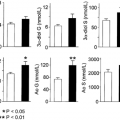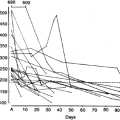AFFERENT MECHANISMS IN THE CONTROL OF APPETITE
Part of “CHAPTER 125 – APPETITE“
Different hypotheses have been advanced about the mechanisms involved and the signals that are sensed by the hypothalamus in the control of appetite. The glucostatic hypothesis proposes that a reduced availability of glucose in the hypothalamus stimulates food intake, whereas increased glucose utilization produces a sensation of satiety.3 This hypothesis is supported by several studies that have established that the transient decline in blood glucose is a signal for meal initiation. The lipostatic hypothesis postulates that adipose tissue secretes a humoral signal—in proportion to the amount of body fat—that acts on the hypothalamus to decrease food intake and increase energy output.4 The thermostatic hypothesis suggests that a fall in body temperature below a given setpoint stimulates appetite, and a rise above the setpoint inhibits appetite.5 Food intake increases in cold weather and decreases in warm weather. There is, however, little evidence that body temperature is a major regulator of food intake. The gutpeptide hypothesis postulates that food in the gastrointestinal tract causes the release of satiety signals from the intestine that act on the hypothalamus to inhibit food intake.6 Besides different physiologic factors, it is important to remember that food intake is a complex behavior. In humans, it is also influenced by cultural factors, environment, stress, mood, and past experiences related to the sight, smell, and taste of foods.
Stay updated, free articles. Join our Telegram channel

Full access? Get Clinical Tree





